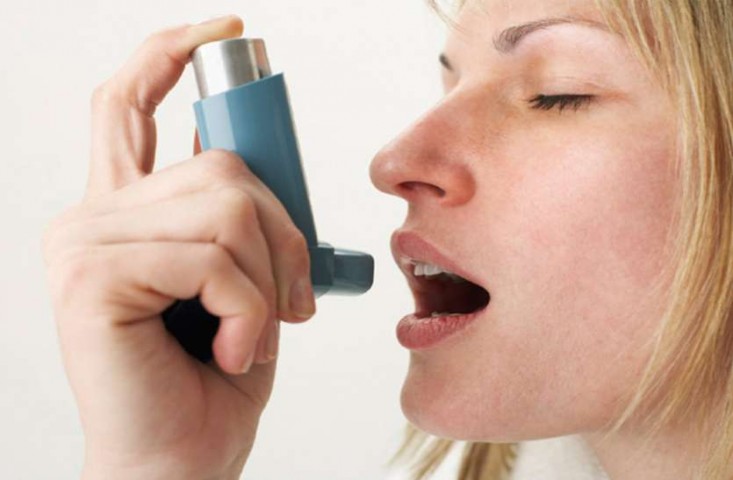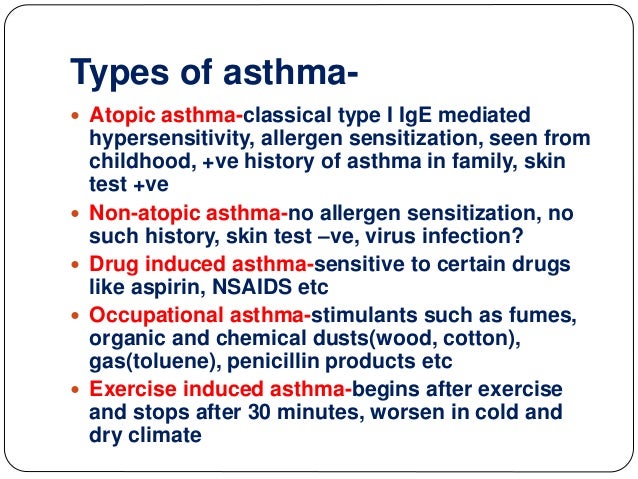108 Glen Osmond Road, Parkside

Asthma is a respiratory condition marked by attacks of spasms in the bronchi of the lungs, causing difficulty in breathing. It is usually connected to allergic reactions or other forms of hypersensitivity.
TYPES OF ASTHMA :

Bronchial Asthma is classified into :
I. Atopic or Extrinsic Asthma (Early onset Asthma)
* Usually begins in childhood
* It generally occurs in atopic (hereditary predisposition toward developing certain hypersensitivity reactions) individuals prone to allergies like colds, sneezing, and skin rashes.
* External factors (like smoke, dust, and pollen) are responsible for causing the asthmatic attacks. Hence also called extrinsic asthma.
III. Occupational asthma
Certain occupations can be harmful for people with an allergic background, e.g., bakers, farmers, and poultry men are exposed to large amounts of fungus. Farmers and gardeners are exposed to pollens, mattress renovators to house dust, beauticians, barbers to dyes, and animal dander (skin scales or fur of animals).
Main Symptoms Of Asthma :
The most common symptoms of both extrinsic and intrinsic asthma are the following:
* Coughing
* Wheezing
* Shortness of breath
* Rapid breathing
* Chest tightness
Causes or Triggers Asthma :
People with asthma have inflamed airways that are sensitive to things that may not bother others. These things are “triggers.”
Asthma triggers vary from person to person. Some people react to only a few, while others react to many.
If you have asthma, it is important to keep track of the causes or triggers that you know provoke your asthma. Because the symptoms do not always occur right after exposure, this may take a bit of detective work. Delayed asthma episodes may occur depending on the type of trigger and how sensitive a person is to it.
The most common asthma triggers include :
Allergies (Allergic Asthma)-
Substances that cause allergies (allergens) can trigger asthma. If you inhale something you are allergic to, you may experience asthma symptoms. It is best to avoid or limit contact with known allergens to decrease or prevent asthma episodes. Common allergens that cause allergic asthma include:
* Dust mites
* Cockroach
* Pollen
* Molds
* Pet dander
* Rodents
Irritants in the Air-
Irritants in the environment can also bring on an asthma episode. Although people are not allergic to these items, they can bother inflamed, sensitive airways:
* Smoke from cigarettes
* Air pollution such as smog, ozone, and others
* Wood fires
* Charcoal grills
* Strong fumes, vapors, or odors (such as paint, gasoline, perfume, and scented soaps)
* Dust and particles in the air
* Chemicals
Respiratory Illness-
* Colds
* Flu (influenza)
* Sore throats
* Sinus infections
* Pneumonia
* Respiratory infections are the most common asthma triggers in children.
Exercise-
Exercise and other activities that make you breathe harder can affect your asthma. Exercise – especially in cold air – is a frequent asthma trigger. Exercise-induced bronchoconstriction (EIB) is a form of asthma that is triggered by physical activity. It is also known as exercise-induced asthma (EIA). Symptoms may not appear until after several minutes of sustained exercise. (If symptoms appear sooner than this, it usually means you need to adjust your treatment.) With proper treatment, you do not need to limit your physical activity.
Weather-
Dry wind, cold air, or sudden weather changes can sometimes bring on an asthma episode.
Feeling and Expressing Strong Emotions-
When you feel strong emotions, your breathing changes – even if you don’t have asthma. It may cause wheezing or other asthma symptoms in someone with asthma.
Medicines-
Some medicines can also trigger asthma:
* If you are sensitive to aspirin and NSAIDs (nonsteroidal anti-inflammatory drugs)
* If you take medicines known as beta-blockers, they can also make asthma harder to control
Other Asthma Triggers-
Other triggers to consider and discuss with your healthcare provider are:
* Sulfites in food
* Hormonal changes during the menstrual cycle
* Other medical problems like reflux (GERD)
Talk to your healthcare provider about your asthma and your triggers. Be sure to discuss any changes in your asthma management.
Ayurvedic view :
A detailed description and differential diagnosis of a group of disorders involving respiratory distress (dyspnea) is given in all three of the major Ayurvedic compendia. These diseases are collectively known as Swasa Roga, of which five varieties are described. These include: maha swasa, urdhva swasa, chinna swasa, ksudra swasa, and tamaka swasa. The last variety, tamaka swasa, corresponds to chronic persistent bronchial asthma of allopathic medicine. In Ayurveda, it is considered the only type of respiratory distress that can be controlled, and then only with diligence on the part of the patient and physician. In striking similarity to the modern allopathic description, tamaka swasa is defined in Ayurveda as a chronic and recurring condition characterized by dyspnea, cough, airflow obstruction, and wheezing. Although the concept of atopy and hyperreactivity was unknown, Ayurveda was clear on its understanding of this condition as multifactorial, including environmental and emotional factors.
Pathogenesis according to Ayurveda :
In Ayurvedic texts, asthma is known as tamaka svasa, one of the kaphaja diseases in the category of svasa or dyspnoea (shortness of breath).
Initially, in the samprapti (pathogenesis) of asthma, vata is provoked with urdhva gati (upward vector). Entering prana vaha srota, the respiratory tree, it aggravates kapha in the bronchial mucus membranes.
The purva rupa or premonitory signs outlined in the texts include headache, cough, chest pain, mood swings, running nose, and thirst."Vata, getting aggravated, begins to move in the respiratory channels, aggravating kapha and producing breathlessness with catching pain in the head, neck, chest, and flanks, cough accompanied with a cracking sound, delusion, loss of appetite, running in the nose, and thirst."
The disease process, moving through astayi rasa dhatu, can swiftly proceed to rupa, cardinal signs and symptoms of a full-blown asthma attack: cough, wheezing, breathlessness, chest tightness, rapid breathing, and orthopnoea (difficulty breathing when lying down).
Treatment according to Ayurveda :
While an individual's constitutional type must always be kept in mind when developing a treatment plan for any disease, asthma is nevertheless generally treated by pacifying Vata and Kapha doshas. The treatment will always include two main strategies:
a) purification therapies (panchakarma) to eliminate the vitiated doshas.
b) herbal therapies to help re-establish normal physiological function in the affected tissues and organs.
However, asthma is highly variable in its course, and clinicians need to tailor their treatment plans to the needs of each individual patient. The general Ayurvedic principle is to initially gain control of the disease as quickly as possible with strong Vata and Kapha purification measures, which are then followed by appropriate herbal therapies.
Ayurvedic Herbs and Herbal formulations used are :

Kalmegh (Andrographis paniculata): Kalmegh is used in Ayurveda for upper respiratory health during seasonal stress symptoms of headache, tiredness, earache, sleeplessness, sore throat, nasal secretion, phlegm, and frequency and intensity of cough. Andrographis is beneficial and safe for relieving acute respiratory tract infection symptoms and shortening the time to symptom resolution.
Tulsi (Ocimum sanctum): Holy Basil is an effective herbal remedy in Ayurveda for asthma, bronchitis, cough, and cold, and also heals the damage caused to the lungs due to cigarette smoke. Studies have revealed a variety of actions, including antimicrobial, anti-inflammatory, analgesic, anti-allergic, immunomodulatory, anti-asthmatic, and adaptogenic activities, which can also help in dealing with asthma.Thyme Oil: Thyme essential oil is beneficial in boosting the immune system and strengthening the respiratory system with its antiseptic, antibacterial, and expectorant properties. It is effective in eliminating all asthmatic symptoms, including coughing and colds.
Eucalyptus: Eucalyptus oil has a strong scent that helps in decongesting airways. The oil contains eucalyptol, which breaks down any phlegm and mucus in your system and allows you to breathe easily.
Peppermint: Peppermint essential oil has decongestant and antihistamine properties that relieve asthma attacks. Exposure to allergens such as dust mites and pollen triggers your body to release histamines, which in turn trigger asthma attacks. Peppermint inhibits the release of histamine in your body.
Jaypatri (Myristica fragrans): Jaypatri has a bitter, pungent taste and is used as alexiteric, as medicine for bronchitis, asthma, thirst, and to improve appetite.
Kantkari (Solanum xanthocarpum): Kantakari is good for asthma due to its cough-relieving and anti-inflammatory properties. It decreases inflammation and the production of mucus in the air passages, which is considered to be useful in asthma. Kantakari also has anti-allergic properties, due to which it inhibits allergic asthmatic reactions.
Diet and other Regimens:
/tips-to-keep-running-with-asthma-200591_final-388ddca95e174c8285029c4015cd3967.jpg)
Disclaimer : Sandeep Kumar and Anupam Vasudeva are not GP, they have Ayurveda medical degree from India where it is considered equal to any other medical degree. This qualification is recognized in Australia by vetassess governing body as Complementary Health Therapists. Life Line Ayurvedic Herbal Clinic does not claim to cure a disease or terminal illness and does not create any unreasonable expectation of beneficial treatment. Ayurvedic medicines and treatments are generally considered to be safe but rarely may be associated with possible adverse reactions in individual cases. We recommend seeking urgent medical attention in the case of an adverse reaction. This website provides you with information. You must contact your Ayurvedic or another health professional before you apply them. Read More